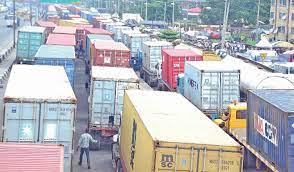On February 28, 2021, the Nigerian Ports Authourity (NPA) introduced what was then thought as the game–changer for Apapa traffic. By the explanations that were given by the NPA, an electronic call-up system would be deployed from used to direct truck movement into Lagos ports of Tin Can and Apapa.

The NPA rested the implementation on five pillars, which were supposed to hold the operations of the electronic call up via the eto app.
According to the NPA, trucks must be called upon using the Eto electronic call-up system before they could gain access into the ports. Therefore, all trucks and their owners are expected to download the Eto App and sign-up in order to become part of the new system.
“It would be done transparently on a first-come-first-served basis. We have also requested for the operator to have a dashboard in front of port locations where the movement of trucks would be displayed for truckers to see their daily schedule,” Hadiza Bala Usman, the then-managing director, Nigerian Ports Authority (NPA), has said.
Ordinarily, this ought to have removed human intervention in the process of managing truck movement in and out of the ports. It was also expected to put an end to the problem of extortion of truckers by security operatives in charge of traffic control within the Apapa corridor.
Another pillar of the electronic call up is that, trucks must stay at designated parks, and to achieve this, some truck parks were selected. This means that, under the e-call up system, trucks that are not parked within the approved parks would no longer gain access into Lagos ports to pick cargo.
What this clearly meant was that, with the electronic call up, trucks should cease to park indiscriminately on Apapa roads and bridges. This is expected to eliminate the ugly perennial traffic gridlock that have been the lot of the port city; Apapa for so many years.
One clear condition with the use of eto and the e-call up is that a fee of N10,000 only will be paid. According to NPA, truckers are expected to pay a token of N10,000 for utilising the Eto App and to park in the truck park. The download of the App is free and truckers are only expected to make payment when they want to exit the park.
The fact is that, by the initial arrangement, there is no other fee to be paid by truck owners to access the port or park at the transit park.
At the onset of the new arrangement in February, NPA made it clear that consignees should drop empty containers at the holding-bay of shipping companies, from where the shipping lines are expected to be responsible for taking the empties into the port.
At its conception, the electronic call-up system was expected to restore sanity within the Apapa port corridor by removing the daily traffic congestion.
Read Also: With Deep Blue Assets, NIMASA No Longer Has Reason To Fail
These looked good on paper, and they actually worked in the first two days, then the unexpected began to happen, thus threatening the start-up success of the e-call up.
First, petroleum product tankers descended on the approach to Tin Can port from Mile 2, they queued up to load products at the tank farms, and in the process thinned out the main expressway. Second, by the following week, un-laden trucks also trouped out from somewhere around Mile 2.
And by later the same week, the approach from Ijora to Apapa ports had started seeing a long queue of flatbed trucks on the bridges.
Added to these is the extortion that has resurfaced on the Lagos ports corridor, where the various personnel of government agency who have been drafted to the ports corridor have been compromising.
By its own admission too, the NPA recently acknowledged that, there are over 30 checkpoints within the Apapa and Tin Can Port axis, and we believe that this is a major issue causing delays and a whole lot of problems.
Even though the Lagos state government has impounded many trucks for infractions, despair is gradually setting in on the part of all stakeholders, who had endured years of pains and business losses on account of the terrible vehicular traffic.
Perhaps the strongest confirmation of the rot is the sack last week of 6 truck parks for various infarctions.
It will not be out of place to state that the whole essence of the electronic call up has been destroyed by the abuses that have surfaced. It is sad that the those who took advantage of the old system have regrouped and are the same actors who are frustrating the electronic call up.
All that the NPA and TTP promised were not fulfilled, and that is why industry stakeholders say that the new system was only meant to rake-in money into the coffers of the government.
It is not late to still sit with stakeholders. Even though the NPA and the operators of the e-call up were confident that it would be a success, events in the last few months have shown clearly that, a lot still needs to be done.
Both the NPA and the operators of the electronic call up should go back to the drawing board and re-strategize. The take up point may be to meet with stakeholders who are critical to the operations of the new truck call up system.
It will be appropriate to take a second look at the promises made at the onset of the new system in February.
















Discussion about this post